Short history
I’ve restarted my combative journey about a dozen of times in the last 25 years. There were years of gaps when life just got in the way, then there were those more active periods where I was all in, training every day with the intensity of a newcomer. The hunt for a club to be a part of was turbulent. I’ve probably visited more dojos than I’ve had hot dinners. I would go from club to club every few months, and eventually I had almost as many joint injuries as many clubs I tried to train at.
As I began to take my development seriously and think about competing, the challenge of finding a training club became increasingly frustrating. Competing has been a way for me to measure my progress since I was 7 or 8 regardless of the field I entered. I knew that a strategy is needed. I knew how to build that strategy, but I didn’t know where I would get the components of that strategy. This game had a strong interpersonal aspect, with complex mechanics and intense human dynamics driving it. Guidance was very needed but didn’t seem to come along. The clubs I tried all seemed to be missing the mark. This is where the problems occurred:
- The majority of clubs were content with basic instruction that could not be tailored to different body types, personality types, genders, or cultural differences.
- They lacked the structure needed for serious advancement or to match competitive drive.
- The coaches seemed to be unaware of their own prejudice, favouritism, and the impact they had.
My decision to take martial arts training seriously came from a deeper need for transformation, looking for better life experiences and peace within myself. Traditional approaches didn’t bring about the change. While some alternative personal development programs showed promise and offered glimpses of progress, the real breakthrough came when I returned to training, and this time to grappling arts. The controlled and manageable level of exposure to challenges, the modest stretch of my comfort zone with the freedom to withdraw anytime, finally cracked open the shell of stagnation. However, transforming that initial breakthrough into a complete life overhaul became an entirely different journey.
The road blockers
That all is already a pre-pandemic story, but not a unique story. Most guys I’ve trained with along the way were there to grow. The art had the potential to help them achieve their goals, yet the inadequate system let many of them down. Here’s where it often went sideways:
- Coaches who crossed the line from tough love to outright abuse
- Training structures that failed to deliver technical understanding and muscle memory
- Toxic favouritism that poisoned the atmosphere with the inability to handle everyday conflict further festering rapport
The promise of transformation was there, dangling like a carrot, but the system was dysfunctional so the life-changing potential of training remained manifested in a lot of cases. Among the mismanaged conflicts and coaching blind spots, what should have been a launching pad for growth became a quicksand for many.
The number of questions to answer was increasing rapidly, and the length I had to go to answer them felt unreal. Sometimes I was happy with the findings, sometimes I was less so. But what came out of this 5-year long journey is a crystallized vision of what a progressive support system could look like to help training achieve its life-transforming potential.
It wasn’t about training anymore, neither for me nor for the people who joined along the way—it was about creating a system that could turn the investment people make in themselves into higher life-quality.
Why combative arts?
What makes martial arts a special case for self-development is that when training regularly, fighters stretch their physical and mental skills simultaneously, stirring up their inner world to achieve change. There is no more challenging work in life than changing oneself. However, when starting from a well-defined angle with one highly specific goal, such as tournament success, the energy is so well-channelled that it can bring a profound result much faster than any other approach could. The dojo becomes a laboratory for self-discovery, where each training session peels back another layer of limitation.
Fighters who are focused on winning a tournament work hard for the themselves in ways they usually wouldn’t or couldn’t do. They uncover the essence of human dynamics through this effort, starting with the club environment and expanding to other aspects of life.
That is why martial arts provide a rich soil to grow in, even for the smallest seeds.
Why grappling arts?
We focus on grappling arts because they are specifically relevant for building resilience. Due to their highly intrusive nature, these artforms can induce an unusual amount of stress during practice as they challenge the internal status quo and the fighters’ own view of themselves with every roll. At the same time, these disturbances occur at the managerial level, and the repetition of exposure presents numerous opportunities to reflect, retry and progress gradually.
But it’s support that makes a champion in life, and that support is essential to navigate through the noise, the crowd, the unknown, and the disturbing. For challenges to result in growth instead of collapse or quitting, a reflective and personalised support needs to be available that is tailored to the person’s unique circumstances and struggles. Advices like “Just push through it” – lacks depth and understanding, “Think less” – lacks knowledge of brain-body complexity, “It’s just your ego” – oversimplifies deep-rooted behaviours. Unfortunately, baseline coaching often relies on these slogans, which can let many fighters down.
Playing for the highest stake
Bigger plans and grander ambitions particularly suffer from the lack of adequate help. Competition success may be achievable on a local level with natural personal resources, but from a certain stake, the pressure and complexity pass beyond the level that can be managed through born talent and basic strategies.
Working for high-stakes success isn’t about working harder—it’s about working differently.
The depth needed to be reached, and the sensitivity to know what to touch and what not, is a different profession itself, which unfortunately is not currently included in coaching or training courses. While the market is saturated with physical preparation guidance, with different levels of credibility, the necessity of mental skills remains largely unrecognised and is not included in training protocols.
Why is it like this?
The current state of things may be a result of two potential reasons:
- The unresolved gap between research and practice is a barrier to utilising knowledge that could contribute to quality materials and making academic findings applicable in real life contexts. The major challenge is still finding ways to operationalize ideas on how to build self-governance, whether it’s specifically competition skills or general ability to navigate life, leaving the door open for misinterpretation and lack of adoption.
- Training clubs as sources of peer support have largely been unrecognised, while they are instrumental in the development of life skills. They offer alternatives to traditional services for those who are deemed to be non-typical and/or uncomfortable getting involved in institutionalised support. The failure to acknowledge training as a means of self-development results in great negligence in setting standards and providing reliable guidance.
It can be improved
Our core purpose is to turn academic insights into practical solutions. Where knowledge gaps exist, we see opportunities for innovation and growth. Our primary research is focused on the support needs of what is commonly called the ‘need for achievement’ personality type. As they’re conflicting the stereotypical ‘hopeless’ image of a help-seeker and often expected to be a helper themselves, finding adequate support is significantly more challenging for them.
We aim to build efficient practices with clear, noise-free guidance. For that reason, the published materials are concise and practical. As What Is Truth has grown out of the battle its founding members fought to find contemporary mental training resources, we keep everything down to earth and immediately applicable. To ensure the usefulness of the courses and articles presented, we keep the theoretical background of each piece to a minimum, but typically incorporate the considerations in a summary article.
The progress made
Since 2020, we have developed the first and only research-backed, structured program for the mental aspect of competition preparation, established a cutting edge model and coaching framework for combat resilience, run two academic research studies, and laid the foundation for the support hub.
We don’t stop there. We’ll continue working towards the support system of the future, building new resources, and backing up those who are stepping out.
The What Is Truth (or WIT for short) support hub aims to fill the gap in mental preparation for combat sports, creating a bridge between academic research and real-life needs to offer modern tools for fighters. Beyond the one-size-fits-all approach that dominates the mainstream, we strongly focus on guiding fighters towards building their own tailored practices. The materials offered build on a multidisciplinary approach to merge relevant knowledge from multiple scientific domains.
Get involved
We are always seeking professionals to share their expertise and collaborate with us. As part of our vision, we warmly welcome club owners and coaches who have the capacity to team up with us for a research project. There are several additional ways to collaborate, including brand, merchandise, and program collaboration. Please feel free to kickstart the conversation via our contact form.
To be notified of future posts and updates, please join us on Instagram. If you’re interested in covering our story, there is a selection of assets available in our press room.


